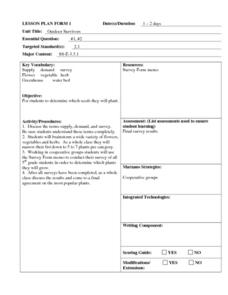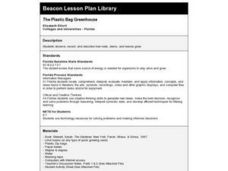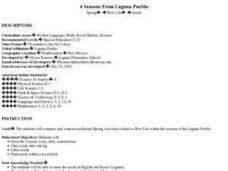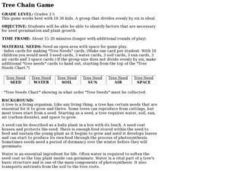Curated OER
Glossaries
Explore text structure with a focus on the glossary feature in informational texts. Learners read a brief introduction before examining a glossary from a text about plants. They reference it while completing four comprehension questions....
Curated OER
Bean Plant Growth
Students identify, monitor, and analyze how seeds grow into plants and reproduce seeds at a quick rate. Students record the rate at which plants grow. Students identify what plants need in order to grow. Students share and discuss their...
Curated OER
You Can Depend On me
Discover the natural beauty of California. With a conservation bent, this activity delves into some of the attributes that make this state unique. Learners discuss Yosemite and the forest habitat. They focus on the things plants and...
Curated OER
Plants
Students identify and label parts of a plant. They will construct a plant from art material and describe the purpose of each part for the plants survival. Students author a book with pictures and words or a story about a plant.
Curated OER
Our Friends or Foes
In this living organisms worksheet, 6th graders choose the multiple choice answer to 10 questions. Students then read and answer 10 statements as true or false and fill in the blanks to 5 statements.
Curated OER
Understanding the Roots
Learners investigate the parts of a flower. In this earth science lesson, students read the book The Magic School Bus Plants Seeds and identify various plant parts. Learners construct a model of a flowering plant from various art supplies.
Curated OER
Plant Growth
Learners role play as text book creators by designing an animation showing plant growth from seed to maturity. They incorporate things that plants need to grow in the animation.
Curated OER
Getting a Handle on Your Bee
Middle schoolers observe dried bees, carefully glue them to toothpicks, and use them for cross pollinating their Brassica plants. They also describe reasons why two similar investigations can produce different results. Finally,...
Curated OER
Ph-ocusing on Photosynthesis In and Out of the Garden
Students are introduced to the concept of photosynthesis. As a class, they brainstorm a list of what they already know about plants and individually grow a plant on their own in the classroom. They record their observations daily and...
Curated OER
Outdoor Survivors
Fifth graders complete a survey to decide what are most popular plants among the class. They test the water quality in a nearby pond. Studnts test the quality of soil samples taken from their homes. Different plants are moistened with...
Curated OER
The Plastic Bag Greenhouse
Third graders observe plants and record their growth. They describe the parts of plants in detail including the roots, stems and leaves.
Curated OER
Four Seasons From Laguna Pueblo
Students study seeds and spring planting. They plant corn, chili, watermelon seeds in a local field and then invite a farmer to come to discuss the preparation, caring and planting of seeds in a field.
Curated OER
It's Just Dirt
Young scholars discover how seed germination varies according to the soil type. In this soil science lesson, students discuss what plants need in order to grow and investigate various types of soil. Young scholars use their senses to...
National Christmas Tree Association
Merry Christmas, Geraldine
If you're reading the story "Merry Christmas, Geraldine" by Holly Keller, this is a fantastic cross-curricular resource to use. Complete with activities for language arts, science, social studies, art, and math, you'll get the most out...
Curated OER
The Living Environment
In this living environment worksheet, students complete a crossword puzzle given 34 clues about the various species in the environment that produce, consume and decompose. Topics also include photosynthesis, respiration, glucose, organic...
New South Wales Department of Education
Plant Groups
Bryophytes can grow in temperatures just above zero degrees. This 17th installment in a series of 20 introduces learners to the five groups of plants: algae, bryophytes, pteridophytes, gymnosperms, and angiosperms. Classes then explore...
Curated OER
Pumpkin Time
Students visit a pumpkin farm and discuss the characteristics of a pumpkin and how they grow. They create a class story about the trip to the farm with each student supplying a sequence for the story.
Cornell University
Sun or Water? or Both?
Over the course of 10 days, young scientists observe their cups of seed and soil—one that gets sun and water and one that gets no sun and only water. Then they reflect on the results of the experiment to determine if their hypothesis was...
Desert Discovery
Life Cycle of the Saguaro
Third graders make books which illustrate the growth and development of a saguaro cactus from its beginnings as a seed all the way through its death. They trace the life cycle of the saguaro, identify each of the stages in its life,...
Curated OER
Pollination Power
Second graders study and examine the structure of a flower. In this pollination lesson, 2nd graders observe pollinators in the garden and dissect a flower. Students then plant strawberry plants in the garden and observe the process...
Virginia Department of Education
Weather Patterns and Seasonal Changes
Get your class outside to observe their surroundings with a lesson highlighting weather patterns and seasonal changes. First, learners take a weather walk to survey how the weather affects animals, people, plants, and trees during...
Curated OER
Recyclers to the Rescue
Producers, consumers, food chains, and plants are the stars of this science lesson. Learners take part in an inquiry which helps them to discover the most effective and efficient way to grow a producer. They have a variety of containers...
The Science Spot
Flower Basics
Learn about plants and pollination with a worksheet about the parts of a flower. After labeling the anatomy of a flower using a word bank, kids explain the difference between self-pollination and cross-pollination, and unscramble...
Curated OER
Tree Chain Game
Students identify the necessary factors for seed germination and plant growth in a game format.

























